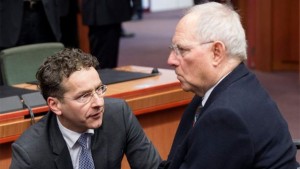The perspective on the Greek crisis, fed to most Americans by way of the megabank-controlled, mainstream news media, has been based on criticism of a “leftist” or “socialist” Greek government. The magic words, leftist and socialist are intended to portray the Greeks as the bad guys in the picture, whereas those characterized as the “good guys” – die Erbsenzähler (led by German Finance Minister Wolfgang Schäuble) are portrayed as patiently leading the petulant Greeks toward the path of financial responsibility.

Nothing could be further from the truth. For starters, Alexis Tsipras of the Syriza party was not elected Prime Minister of Greece until January 26, 2015. His predecessor, Antonis Samaras was a member of the New Democracy party.
Many bloggers and financial writers have been criticizing the European Central Bank’s handling of the Greek financial crisis since 2010. Edward Harrison has written extensively on the subject at his Credit Writedowns blog. On June 29, Mr. Harrison provided a history on the crisis:
First, let’s remember that back in 2010, most of the creditors to Greece were in the private sector, many of them banks in other Eurozone countries. At that time, the fragility of the European and global economy, and of the European banking system was much greater than it is now. And this caused Europe to panic. What’s more is the EU was able to corral the IMF into joining the EU in bailing Greece out, even though doing so broke its own rules and disregarded the analysis of its own economists. This was the original mistake and the whole chain of events since then has been a futile attempt to justify that original decision.
* * *
The most obvious answer is the weak banks. The now deceased former German Central Bank Head Karl Otto Pöhl said at the time that it was all about rescuing weak German and French banks – and rich Greeks too. This is most definitely true. For example, back in 2012, the FT’s James Mackintosh quoted JPMorgan which reckons only 15 billion euros of 410 billion in ‘bailout’ funds actually went to the Greek economy. The rest went to creditors of the Greek government.
The ongoing intransigence of the troubled nation’s troika of creditors (European Central Bank, the International Monetary Fund and the European Union) has drawn harsh criticism from a wide assortment of astute individuals. From here in the States, Mike Shedlock (a/k/a “Mish”) has been a frequent – yet well-reasoned and balanced – critic of the Eurogroup’s stance. Here is what Mish had to say on July 10:
German chancellor Angela Merkel has stated many times recently that Greeks got generous terms on its alleged bailout.
Merkel is either a blatant liar or dumb as a rock. I believe the former. It is the bailed out banks in Germany and France that got generous terms.
To save French and German banks of €60 billion or so in losses on Greek bonds they never should have purchased in the first place, eurozone taxpayers are now on the hook for at least €326 billion.
Draghi’s famous “whatever it takes” speech should have been suffixed with “to save the banks”.
Greek and eurozone taxpayers got the shaft and remain at risk.
On July 12, Mish shared his reaction to “THE Final Offer Before Grexit”, as presented by the Eurogroup:
The wording of this document makes it clear Germany wants to push Greece out of the eurozone.
Please review the final sentence of the proposal. Here it is again: “In case no agreement could be reached, Greece should be offered swift negotiations on a time-out from the euro area, with possible debt restructuring.”
If Greece turns down the offer, it gets “swift” negotiations on a “temporary time out“, including the possibility of restructuring.
In contrast Greece has no chance of restructuring if it accepts all of the above demands.
Tsipras would be a fool to accept this proposal.
As I have said all along, Greece’s best chance is to default, not pay back a cent, and initiate the reforms it needs to grow over the long haul.
Greece does not need the euro. No country does.
Economist Steve Keen did a wonderful job debunking all of the falsehoods, which have been relied upon to justify the imposition of an absurd austerity regimen on Greece. Dr. Keen also pointed out why the troika – rather than the Greek government – would be at fault in the event of a Grexit. Here is his July 6 BBC interview.
The Eurocrats are pressing their luck too far. If this stupidity persists, we should expect some awful consequences.